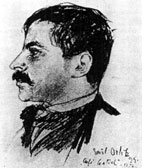The art of storytelling
The Art of Narration is a dialogue essay by Jakob Wassermann , written and published in 1904.
content
In an alternating speech on the “nature and laws of storytelling”, a veteran author, the schoolmaster, teaches a young author how to write prose. The schoolmaster initially defines “comfort” as “the ideal reader's unlimited trust in the narrator”. Trust, in turn, arises “through credibility”. Only those who feel the need to tell something are credible again.
Wassermann puts forward the thesis that all art arises through movement. Acting characters, however, need resting points so that, detached from the plot, they are still capable of a life of their own. In between, the author has to mediate with the aim of “rhythmic prose”. This is also a balancing act between abundance of expression and at the same time economical use of words. The schoolmaster advises against a breathless writing style, because no reader can endure barrage for long.
The narrator should hide behind his text. An invisible author is a good author, but only a recognizable narrative concern leads to a good text.
According to the schoolmaster, a beginner cannot actually write at all, because “epic art” requires “a perfect maturity of the mind”. Pictures can only be put into a sequence with calm and all available mental strength. There is something visionary about this intellectual power in the narrator. Resounding success can only be achieved by a work whose author can bring such a vision to the fore. Vision glorifies and exalts everything "subconscious" that the silent ones kept to themselves. The poet collects the experiences of his contemporaries and reproduces them in the shortest possible form; condensed into a new world - his poetry.
Aquarius considers the art of writing not to be lucky but rather an act of despair. The artist never has art, only restlessness. He wants to "get to know himself". Above all, according to the author, he must not fall in love with his work, but must maintain a critical distance (Aquarius: "hate"), constantly looking for the next gap. With love and happiness, weaknesses can hardly be found.
It is not easy to find the right course of action - walking the country road is boring, an author will get stuck in the undergrowth.
When, years later, the now successful student meets his old schoolmaster again, he complains about teachers who dictate the way. That is wrong, every beginner has to find his own way.
Quotes
- "He who defies the instruction cannot even become a student."
- "God is humble, he is hidden invisibly in his world, and it is the same with the great artists."
literature
- Margarita Pazi in: Gunter E. Grimm , Frank Rainer Max (Hrsg.): German poets. Life and work of German-speaking authors. Volume 7: From the beginning to the middle of the 20th century. Stuttgart 1991, ISBN 3-15-008617-5 , pp. 40-46.
- Rudolf Koester : Jakob Wassermann. Berlin 1996, ISBN 3-371-00384-1 .
- Peter Sprengel : History of German-Language Literature 1900–1918. Munich 2004, ISBN 3-406-52178-9 , p. 381.
- Gero von Wilpert : Lexicon of world literature. German authors A – Z. Stuttgart 2004, ISBN 3-520-83704-8 , p. 651.
source
Jakob Wassermann: The art of storytelling . Greifenverlag Rudolstadt. 72 pages, without indication of the year of publication
expenditure
- Full text as part of the anthology Imaginary Bridges (1921) on Project Gutenberg
